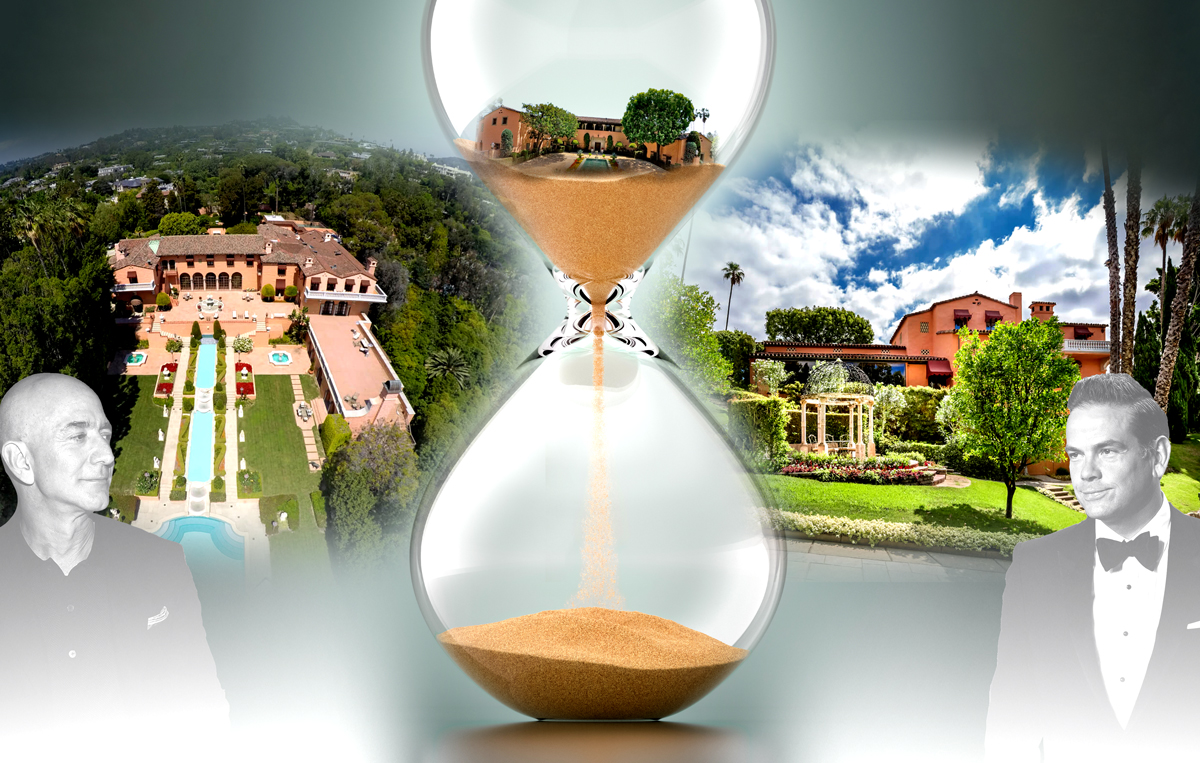When the Beverly House hit the market last month with a $125 million asking price, it seemed crazy, sure, but not that crazy.
Jeff Bezos had just agreed to pay David Geffen $165 million for the Jack Warner Estate in Beverly Hills, and that record sale was preceded by Bel Air mansions selling for $150 million and $120 million in the past year.
So, if those estates could fetch nine figures, why couldn’t real estate investor and attorney Leonard Ross get something similar for a 21,000-square-foot, nearly century-old mansion that had served as a location for the iconic horse-head scene in “The Godfather”, a honeymoon destination for JFK and Jackie O’, and William Randolph Hearst’s love nest?
“Buyers from around the world coming to Los Angeles are currently seeking trophy properties that have a rich history as well as land,” said The Agency’s Mauricio Umansky, who is marketing the mansion. “The time is right for the Beverly House to be the next $125 million-plus sale.”
Ross better hope so. The clock is ticking on him using what could be L.A.’s next nine-figure deal to get out from under nearly $70 million in debt, and get off a financial rollercoaster the 75-year-old has been riding for north of a decade.
TBH 19, a limited liability company that Ross transferred the Beverly House over to in 2015, filed for Chapter 11 bankruptcy last fall. Court documents reveal that the Ross-managed LLC owes investment giant Fortress Investment Group alone about $51 million, and Fortress is preparing to seize the Beverly House unless the debt is paid.
U.S. Bankruptcy Judge Vincent Zurzolo effectively hammered out a temporary truce in January, giving TBH 19 until May 31 to use the Beverly House as cash collateral as Ross hunts for a buyer. After that, Fortress may move to seize the property.
Ross is a figure of intrigue for a dozen lawyers and real estate agents who were willing to discuss his efforts to sell the house with The Real Deal, as long as they did it anonymously. (Ross responded to emailed questions by stating that TRD’s past coverage of him was libelous, and that he may demand retractions or sue. He did not point out any factual errors.)
Some of those who know him wonder if his luck has run out. Others, however, aren’t ruling out Ross finding a buyer in the nick of time.
“I get the sense,” one broker said, “that he has never thought of himself as under the gun.”
Open houses
Designed by Gordon Kaufman, Beverly House is an enduring reminder of L.A.’s early 20th-century Spanish architecture. Built in 1926, the property is massive even by mansion standards, with 18 bedrooms, a two-story library, 102-foot-long upstairs hallway and no fewer than 25 bathrooms.
The property has also variously — and increasingly — been a credit line for Ross, who bought the estate at 1011 N. Beverly Drive in 1976 for less than $2 million, according to sources and court documents. In 1987, Ross tapped Hilton & Hyland’s Jeff Hyland to sell it for $25 million, at least 12 times what he had bought it for 11 years prior.

A view from side of back yard showing second terrace (Credit: Beverly House Estate)
In 2010, Ross and five companies he controlled filed for bankruptcy due to what Ross’ attorney, Steve Wood, chalked up to a cratering real estate market amid the Great Recession. Ross’ debts included $22 million owed to Bank of America over refinancing the Beverly House, records show.
Ross again turned to Hyland, who shopped the property around for $95 million
Nobody bit, but that didn’t stop Ross from later upping the asking price to $195 million and then dropping it to $135 million.
As Ross intermittently tried to sell the house over the past decade, he cycled through a who’s who of top Los Angeles luxury real estate agents, including Drew Fenton of Hilton & Hyland, Kurt Rappaport and Steve Shapiro of Westside Estate Agency, Aaron Kirman of Compass, and Jade Mills and Joyce Rey of Coldwell Banker.
Agents and others who have toured the Beverly House said the home needs work, and some said it lacks refinement. Agents took exception to Ross’ “Art Deco lounge,” which is modeled after Hugh Hefner’s shuttered Los Angeles nightclub, Touch. One agent unfavorably compared it to an “80s cocaine den.”
Perhaps Umansky can sell the Hefner aesthetic, as he was a listing agent on the Playboy mansion’s $100 million sale in 2016.
But there are doubts Umansky and co-listing agent Santiago Arana of The Agency can swing a deal before Fortress, an expert in distressed debt, is expected to try and seize the property.
The Beverly House has “a tremendous amount of history and a great architectural pedigree,” said Aram Afshar, a Coldwell Banker agent who is not involved with marketing the property. “But $125 million is a very tall ask,” in a possibly limited sales window.
“It’s a very difficult property to price,” added Jonathan London of Compass, who is part of Kirman’s sales team. “It has a lot of history and influence, and it’s going to come down to whatever someone is willing to pay for it.”
When pressed for a price, London said the home is worth closer to $75 million than $125 million.
Still, even that number would probably be enough for Ross to sell the house, walk away from his debts, and perhaps put an end to a tangled dispute with Fortress and other creditors.
Respect your elders
The LLC’s bankruptcy is one among several legal matters hanging over the Beverly House.
Ross has also filed a lawsuit in state court claiming elder abuse against his creditors, with Fortress as well as businesses incorporated by former financial adviser Harvey Bookstein and the Glorya Kaufman Trust listed as defendants.
The complaint assails these lenders as “Corrupt, greedy people, indeed crafty creditors of the Dickens variety” who “descended like vultures” in 2015, weeks after Ross’s daughter died.
Fortress fired back with a cross-complaint, excoriating the Ross-founded TBH 19 LLC’s “consistent inability to pay its debts, and manage the financial affairs of the property,” and said the Beverly House should be put in a receivership controlled by the creditor. As for the elder abuse claim, SoftBank-owned Fortress noted that even if Ross were bereaved, he had counsel present when he took out his loan.
Fortress also filed a lawsuit against the Kaufman Trust, asserting the trust reneged on its role as guarantor of the Ross/Fortress loan.
These cases are in a lull, as the parties seek an outside adjudicator to referee the dispute.
Ross is no stranger to voluminous court filings.
According to a 1993 Los Angeles Times profile, Ross went to UCLA Law School where he graduated first in his class and was roommates with famed OJ Simpson attorney Robert Shapiro (Shapiro declined comment except to say he had not been in contact with Ross in over 25 years).
Ross then went into private practice with Barry Marlin.
Marlin subsequently partook in what one FBI affidavit termed the “biggest Ponzi scheme in the nation’s history,” defrauding more than 1,000 investors, according to a 1979 account in the New York Times.
Marlin went to federal prison in 1978, and while Ross never faced criminal prosecution, he was subject to civil lawsuits claiming investor fraud.
Those lawsuits, according to the L.A. Times profile and those familiar with Ross’ career, were actually a windfall for the attorney. Ross turned around and collected millions of dollars in judgments and settlements from insurance liability companies who would not pay his legal defense.
But Ross later suffered courtroom setbacks, including a yearslong feud with Carolina Casualty Insurance Company that ended with a California appellate court loss in 2010, the year of Ross’s bankruptcy filing.
Wood, Ross’ attorney, stressed in a phone interview that Ross paid down “100 percent” of his debt from the 2010 bankruptcies, though he said making those payments possibly created new debts Ross is still sorting through today.
Wood said he was appalled that Fortress could seek to seize the Beverly House from Ross, who has “raised two families there.”
But Ross relinquished his ability to live in the property, according to loan terms that Fortress placed in a cross-complaint, and the homeowner even threatened to call the police when Fortress asked to inspect the property, with Ross declaring it to be his “castle.”
One broker who previously shopped Beverly House said, “He is fighting a foreclosure when there may be nothing left for him to fight with.”
But in the same breath, the agent refuses to discount him: “Len can work it as well as anybody,” the agent said. “Let’s put it that way.”
Contact reporter Matthew Blake at mblake@therealdeal.com
